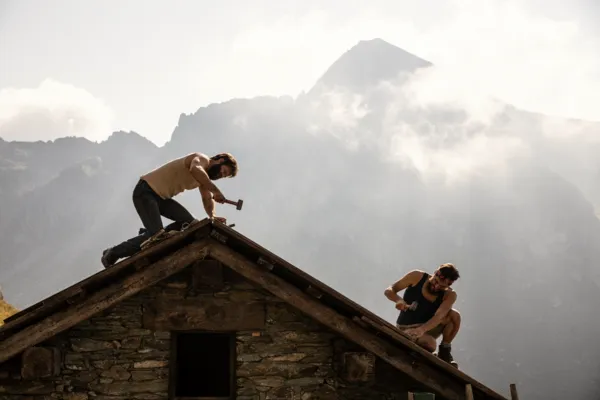Eye For Film >> Movies >> The Eight Mountains (2022) Film Review
The Eight Mountains
Reviewed by: Jeremy Mathews

At once epic and intimate, Felix van Groeningen and Charlotte Vandermeersch’s The Eight Mountains spans several decades, but isn’t about any grand historic figures or events. Instead, it tells the story of two boys whose friendship fades as they become men, only for their bond to revive as life unpredictably marches on. The film is a beautiful work not only for its stunning outdoor cinematography (make an effort to see it in a cinema), but for its ability to capture the magic, regret, love and befuddlement that emerge as we grow older.
The film is framed as the memories of an Italian man named Pietro (Luca Marinelli), who recounts his relationship with his friend Bruno (Alessandro Borghi). The narrator begins during childhood, when his family leave the city for annual summer vacations in a dying mountain village in the Alps. Every other family with a child had already abandoned the town, leaving Bruno as the sole option for friendship during Pietro’s visits.

Writer/directors Groeningen and Vandermeersch, who adapted the film from a novel by Paolo Cognetti, are partners in their personal life as well. Groeningen asked Vandermeersch to co-direct the film after the two of them collaborated on the screenplay during Covid-19 lockdown. They have an impressive ability to subtly let their characters speak for themselves. For example, in an early scene with young Bruno, he avoids conversation about his absent mother. And that simple moment tells us all we need to know, where other filmmakers might have used it as a set-up for a lengthy dramatic catharsis monologue down the road. At two hours and 27 minutes, the film can’t be called short, but given that it plays out over roughly 40 years, the storytelling remains impressively economic.
It’s necessary for the film to take its time to build the story, in order to understand Pietro’s relationship with his mountaineering enthusiast father, Giovanni (Filippo Timi). Giovanni takes Pietro — and, as he gets to know his friend, also Bruno — to beautiful mountain peaks and glaciers. As Pietro becomes estranged from his father during adolescence, and later regrets it during adulthood, it’s important to have the character’s memories, so that we can truly understand his wistful, nostalgic melancholy.
The movie’s strikingly authenticity also adds to the emotional bond. This isn’t a movie with a few scenic establishing shots and then a bunch of material shot on a sound stage. The two men build a cabin, which takes on a lot of emotional and metaphorical weight, and that cabin was actually constructed during production. This gives the performances and action a rare physical essence.
In their quietly devastating manner, Groeningen and Vandermeersch examine the fluid nature of our confusion and confidence over our place in the world. The passage of time reveals that even the most ideal, together life is fragile and subject to turmoil, while a thoroughly lost soul can still find its way. While the revelations are emotionally charged with notes of tragedy, there’s also a sense of balance — that perhaps the state of humankind does not allow for anyone to spend their whole life truly at ease with their position. But we should still enjoy the beauty and the friendship while we can.
Reviewed on: 12 May 2023
















